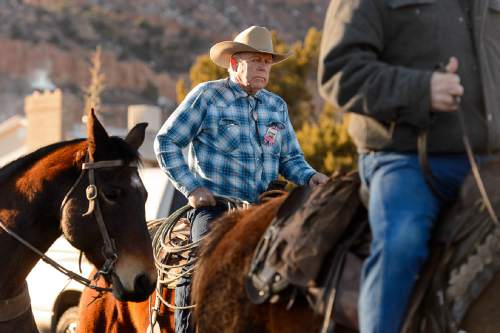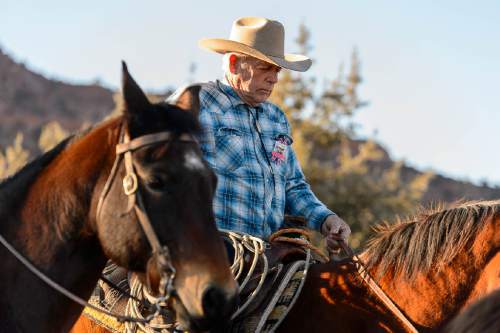This is an archived article that was published on sltrib.com in 2016, and information in the article may be outdated. It is provided only for personal research purposes and may not be reprinted.
Nearly two years after a dangerous standoff in Bunkerville, Nev., over illegal grazing, federal authorities have charged Nevada rancher Cliven Bundy in the confrontation between Bundy's armed supporters and Bureau of Land Management officers who were trying to impound his cattle that had long trespassed on public land.
Authorities took the 69-year-old Bundy patriarch into custody late Wednesday at the Portland International Airport, where he had deplaned en route to support his sons Ammon and Ryan Bundy. The brothers are among 16 arrested for their roles in the 41-day occupation of Oregon's Malheur National Wildlife Refuge, which came to an end Thursday when four armed holdouts surrendered to the FBI.
Cliven Bundy made an initial appearance in Portland's U.S. District Court on Thursday, where prosecutors leveled six felonies against him, including conspiracy, assault on federal officers, firearms violations, obstruction of justice and extortion.
The charges don't reflect his misuse of public land dating back 20 years, when he stopped paying his grazing fees and ignored BLM regulations for his massive grazing allotment near the Lake Mead National Recreation Area. Over the years, his herd ballooned to nearly 1,000 animals, about 10 times what his permit had allowed.
In March 2014, the BLM put Bundy on notice that it intended to remove the cattle. Claiming the federal government had no authority over his cattle, Bundy threatened a "range war" and promised to do "whatever it takes" to protect "his property," according to the complaint written by FBI agent Joel Willis.
"Deliberately lying, Bundy and his co-conspirators pleaded for others to travel to Nevada to 'stop the abuse' by 'making a show of force against' [the officers] in order 'to get them to back down' and 'return the cattle,' " Willis wrote in the 32-page complaint filed Thursday in U.S. District Court in Las Vegas.
Family members in Bunkerville reacted angrily to the arrest. Bundy's daughter-in-law Briana Bundy said the family patriarch wasn't committing a crime in trying to visit his sons.
Briana Bundy questioned why authorities waited almost two years to bring charges, and compared the arrests of Bundy family members and supporters in Oregon to Nazis taking citizens in Europe into custody during the Holocaust of World War II.
"This time, they're rounding up the patriots instead of the Jews," she said.
The BLM initiated the Bunkerville roundup on April 5, 2014, and had about 400 cows corralled when the confrontation climaxed on April 12. Some 400 Bundy followers, many armed with assault rifles, confronted agents at the corral in Toquop Wash, 7 miles from the Bundy ranch.
"Some of these gunmen took tactically superior positions on high ground, while others moved in and out of the crowd, masking their movements behind other unarmed Followers," Willis wrote. "The most immediate threat to the officers came from the bridges where gunmen took sniper positions behind concrete barriers, their assault rifles aimed directly at the officers below."
Holding a tactical advantage, Bundy's followers pressed into the wash where they outnumbered the officers four-to-one. Officers withdrew rather than risk the firefight that was sure to follow if they engaged the snipers, the complaint states.
While the charges indicate the militants' actions put at risk dozens of unarmed protesters and members of the public, Bundy's supporters say it was the heavily armed BLM officers who endangered the public.
At a recent gathering of ranchers in Junction, Utah, one of the militia leaders, Cope Reynolds of Arizona, boasted that he and his armed cohorts prevented bloodshed by forcing the BLM and FBI agents to stand down.
"The fact that we were there kept the thing in check," Reynolds said last November at a meeting also attended by Arizona rancher Lavoy Finicum, who exhorted Piute County ranchers to disavow their grazing contracts with the BLM and run their cattle as they see fit.
Finicum would later become the public face of the Malheur occupation; police shot and killed him after he evaded arrest on Jan. 26.
Bundy attended Finicum's funeral in Kanab last week and he advised ranchers to tear up their federal contracts.
Public Employees for Environmental Responsibility last year had criticized the Department of Justice for failing to prosecute those behind the standoff at Bunkerville, predicting that further capitulating would embolden anti-federal extremists to further confrontations. The Malheur takeover led by Bundy's sons and their armed allies validated that prediction, according to PEER spokeswoman Kirsten Stade.
Her group was relieved criminal charges were finally emerging in the Bunkerville conflict. The 32-page complaint paints a frightening picture, Stade said.
"It certainly does give some perspective on why the federal government capitulated to Bundy in Nevada, as any confrontation clearly would have led to a bloodbath. In this light, waiting for a more ideal time and place to arrest Bundy was a good strategic move in that it avoided the possibility of loss of life on either side, and of making martyrs out of Bundy supporters and further fueling anti-government sentiment," she said.
The Bundys' fights with the BLM resonates with many rural Utahns who believe federal land management is endangering their communities.
Iron County Commissioner David Miller is glad the final Malheur occupiers were taken into custody without incident.
"This land issue isn't a Cliven Bundy issue or a Hammond issue," Miller said, referring to the Oregon ranchers whose incarceration triggered the occupation. "This is about people that want to make a living, to help make America great again."
Miller said his problem isn't with people in the BLM or the Forest Service who are trying their best to be responsible stewards of the land, but a nation "duped by media crap" into believing the notion of "welfare ranchers."
Miller compared the federal government's role to that of a homeowner's association, and in the case of public lands, "the board comes in and they start moving an office into your house and start parking a truck on the property.
"What we're doing is we're turning ourselves into a bunch of socialist-thinking sellouts," said Miller, who at the time of a phone interview with The Tribune said he was driving in Canada, where "I see logs on the back of logging trucks, and I see oil trucks. Do we see any of that in America? It's disgusting."
Utah Gov. Gary Herbert said he is still weighing whether to commit the state to a lawsuit demanding the federal government turn over 31 million acres of public lands within Utah's borders, although he sees the state's land-transfer argument as distinct from the demands made by Malheur occupiers.
Armed conflict is not the way to resolve such disputes, he said, adding that militants' illegal actions are an indication of people's anger toward government.
"I think the events in Oregon just kind of outline the frustration that many people feel because of the lack of good communication and understanding between the federal government and the people who reside in the states," he said. "It ought to be a wakeup call for all of us that there are legitimate issues out there that are causing frustration and leading, I think, to poor behavior."
The FBI complaint describes how Bundy's supporters, many of whom associated with out-of-state militia groups itching for a fight with federal authorities, set up a perimeter after federal agents released the 400 cows they had corralled. They set up roadblocks so no one would try to impound the animals.
The complaint states that followers traveled out of state to threaten contractors the BLM had hired to help in the gathering, transporting and selling of Bundy's cattle. One of those contractors was the R Livestock Connection, a Monroe auction yard in central Utah where Ryan Bundy publicly led a picket, alleging auctioneers were trying to profit from trafficking "stolen" property.
Several Utah counties weighed in, announcing local law enforcement would prevent Bundy cattle from passing through.
The elder Bundy is so far the only person charged in the Bunkerville affair. The charges describe four unnamed co-conspirators, now in custody in "another district," who used deceit to incite hundreds of followers to take up arms against federal authorities, extort BLM contractors, and interfere with federal officers.
On April 2, 2014, the charges state, "co-conspirator 1" traveled to the Utah auction house, where he entered, "threatening and intimidating customers and employees, interfering with business operations and threatening to shut down the business if the contract fulfilled his contractual obligations with BLM."
This is the same co-conspirator who met with the BLM's special agent Dan Love during the April 12, 2014, confrontation, where militants ordered Love and his agents to abandon the cattle-filled impound yard. With dozens of beads drawn on them, officers had no choice but to pack up their gear and withdraw.
Bundy's followers promptly returned the cattle to Bundy and organized security checkpoints and militia camps "to protect themselves and their ill-gotten gains to further interfere with and prevent future federal law enforcement actions on the public lands," the charges state.
Tribune reporters Robert Gehrke, Matthew Piper and Nate Carlisle and The Associated Press contributed to this report.
Brian Maffly covers public lands for Salt Lake Tribune. Maffly can be reached at bmaffly@sltrib.com or 801-257-8713. Twitter: @brianmaffly





